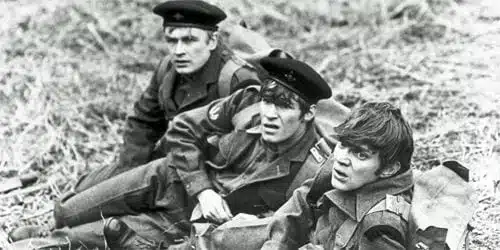
The late director Lindsay Anderson is often lumped with the Kitchen-Sink, Social Realists set, something that confused his admirers outside of England; to members of the Film Brat generation, Anderson seemed anything but pessimistic, an obvious comrade in late ‘60s revolution, making vicious satires designed to rage at, and expose, the establishment — of both society, and film.
OK, only three vicious satires, but If …. and the subsequent, tenuously-linked O Lucky Man! (1973), and Britannia Hospital (1982) could have hardly been better timed – when they weren’t being prescient. Anderson’s international breakthrough, 1963’s This Sporting Life, was of a piece with Britain’s Angry Young Man School of realistic drama, now recalled as that country’s very own New Wave. But If …. arrived six years later, after Bonnie and Clyde and Blow-Up, and while it was hardly as influential and popular, that only added to its subversive clout.
If ….’s non-descriptive title posed a problem; its American distributor wanted to change it, but it had already won the Palme d’Or at the Cannes Film Festival. One left If …. feeling both sucker-punched and shaken-awake, like a new recruit to Fight Club.
After years of DVD neglect, If …. was dusted off and spruced up in a two-DVD HD transfer in 2007 by that imprimatur of importance, The Criterion Collection, and now has been re-released by the same outfit on Blu-ray. There’s no spectacular visual or aural improvement in the new edition (the soundtrack is the original mono), but it does put all the extras on a single disc. These are not be neglected, especially by those who have never seen If …., since they all put the film in both context and perspective — especially Anderson’s Oscar-winning doc about a school for the deaf.
If you are conditioned to avoid commentaries by anyone save a film’s director or an informed historian, you may want to make an exception, here. Here, it pairs a thoughtful critic, David Robinson, with Malcolm McDowell, who stars as Mick Travis, the smirky-smart English schoolboy who leads an uprising against the Whips, fellow classmates who have arbitrarily bestowed with power, and the sniffy masters at his secondary school.
McDowell has devoted much of his middle-age to leading a crusade that would give Anderson a place in the pantheon, but his admiration for the filmmaker who gave him one of his best two roles – the other being the more malevolent anarchist Alex in 1972’s A Clockwork Orange does not overwhelm his insights. McDowell’s are not the usual grateful actor’s anecdotes; he offers us a lifetime of reflecting on what Anderson and this film meant to him and his generation, and why.
The shock of If ….’s narrative and of Anderson’s stylistic daring and nerve –moving back-and-forth between black-and-white and color stock, the abrupt detours into fantasy, or alternate realities usually labeled “surreal” — is not diminished by either the passing of the years, or the media’s own, ever-growing love affair with violence. It was inevitable that the film would be referenced after the numbing horror of Columbine, but Mick and his two lieutenants Wallace (Richard Warwick) and Johnny (David Wood) are not punishment-meting outsiders. They are, like the student leaders of that time, embracing their newly-discovered power to facilitate change, as expressed in Mick’s declaration that “One man can change the world – with a bullet in the right place.” That other public-school-educated Mick, last name of Jagger, was hardly that direct. He had to be content to “sing in a rock and roll band”.
Of course, nearly everybody, including critic David Ehrenstein, who writes the Blu-ray booklet’s introductory essay, views If …. as an allegory or metaphor. It’s just that nobody has ever agreed as to what. England’s class obsessions? Capitalism? The status quo? Ehrenstein also buys into the prevalent assumption that the title is an ironic nod to Kipling’s famous poem about the qualities that make a man a man, or more specifically, a proper gentleman. Anderson never confirmed that, or attached any specific meaning or interpretation to what could simply be Mick’s extended daydream or revenge fantasy. Who’s to say the “surreal” portions of If …. aren’t in fact its reality?
Mick Travis did, however, become a man. He reappeared alive and seemingly untroubled by his rebellious past in O Lucky Man! a film even more imaginative and ambitious than If …. , and more openly comic. It was also written by David Sherwin, from an idea by McDowell. Sherwin also shows up on the Blu-ray for an If …. reunion, broadcast by Scottish TV in2004, along with cast and crew that includes “director’s assistant” Stephen Frears.
O Lucky Man! gave Anderson a broader canvas, which he filled with a much more sprawling spelunk into the human condition. (Note to Criterion: License that film from Paramount tomorrow.) It’s no more easily explained than If …., and McDowell’s even-better performance does no more to simplify or amplify what makes Mick tick. When Mick shows up again (having had a career change from coffee salesman to journalist) in Britannia Hospital, he’s far more incredulous about life than he was in his schooldays, and Anderson too seemed even less inclined to make any definitive judgments. Life is funny, that way.

